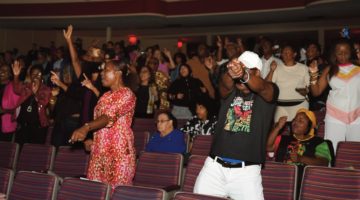MIAMI – A proposed state law in Tallahassee which threatens to eliminate independent police oversight committees throughout Florida spawned protests from the Black community and the local Miami-Dade Independent Civilian Panel that investigates police misconduct including accusations of the use of excessive force.
About 21 police oversight committees throughout Florida including Miami-Dade, Broward and Palm Beach counties are in jeopardy as the bill is floating around the House and Senate committees during the Legislative Session.
At the panel’s Jan. 23 meeting at the Joseph Caleb Center in Model City, the 13-member group urged the community to pull out all the stops including contacting their state representatives and senators to vote against the proposal which could leave civilians without representation in dealing with police unlawfulness.
The panel even went as far as to encourage the community to travel to Tallahassee and express their strong opposition to the bill.
Chairperson Loreal A. Arscott, a lawyer by trade, underscored the significance of the police oversight committee. "It’s important for the community to keep track of this bill," she said. "Contact your representatives in Tallahassee and let them know how important the oversight committees are to the community. There is so much we [the committee] can do but the bill is severely jeopardizing the end of police oversight committees."
House Bill 601, which is being sponsored by two Republicans, Jacksonville state Rep. Dean Black and Jacksonville state Sen. Wyman Duggan, would prohibit local governments or other political subdivisions from passing ordinances or resolutions to create police oversight committees to investigate civilians’ complaints against officers for misconduct.
Black said police oversight committee members who are volunteers don’t have the experience to conduct investigations although some members are attorneys and members of police unions.
He said probes into police misconduct should be left in the hands of current governmental power, such as Internal Affairs at the officer’s agency, the Criminal Justice Standards and Training Commission, the Florida Department of Law Enforcement, the FBI, the U.S. Attorney, the Attorney General, or the State Attorney.
“This bill is just clarifying that the receipt, processing, and investigation is preempted to the state in the sense that not local citizen accountability boards,” Duggan said. “Any existing civilian review boards would no longer have the ability to handle the receipt, processing and investigation.”
He said the bill will not stop a local board from discussing “policies” and “procedure,” though.
Miami-Dade County has several police oversight committees including the Miami Civilian Investigative Committee and Miami-Dade Independent Civilian Panel, and Broward County created its version of police oversight in 2020 called a police review board.
The panels investigate complaints against police officers and hold public hearings regarding concerns and grievances against law enforcement officials, and forwarded their findings to the local police department’s internal affairs units for further action and make recommendations to curb misconduct.
The Miami-Dade County Commission and City of Miami Commission appoint members to the panels from each district represented by lawmakers.
Police oversight panels were created in Miami-Dade following the 1980 McDuffie riots and subsequent allegations of police brutality against Blacks.
In the early 2010s, the Miami panel investigated a series of police shootings that led to the federal government monitoring the city police department.
City police shot 33 people between 2008 and 2011; federal oversight was ended in 2021.
Investigative reports and case evidence made public by the panel has driven media coverage of specific incidents and resulted in disciplinary actions towards officers.
"Getting rid of this level of civilian oversight and the role it plays would be devastating for trust in law enforcement," said Rodney Jacobs, the executive director of the Miami Civilian Investigative Panel and a state Senate candidate. “It’s not only short-sighted, but it’s not looking to the future of how we’re going to innovate police departments,” he said.
According to reports, since police oversight committees were created in Florida, cities saw about a 15 percent reduction in total Black arrest rates and panels’ recommendations for officers sensitivity training in dealing with explosive matters.
Ursula Price, executive director for the Miami-Dade Independent Civilian Panel, said she traveled to Tallahassee to express her opposition for the bill and discovered lawmakers supporting the legislation suggested police oversight committees target police officers.
"I think they misunderstood the duties of oversight committees," she said "They think oversight is like a lynch mob to target police officers for public embrassement with negative outcomes."
Freddie Mitchell, a candidate for Miami-Dade County sheriff in 2024 and a retired lieutenant, said he supports police oversight committees because they keep police officers in line.
"The bill is bad and the community needs to stop this bill from passing," Mitchell said at the Miami-Dade Independent Civilian Panel meeting. "As a sheriff I say yes… I want this in my county."
Marion Brown, a candidate for Miami-Dade County commissioner and community activist, said he spoke out against the bill in Tallahassee, stressing the importance of the panel to the Black community.
"Officers should be held accountable for their actions," he said. "I plan to return to Tallahassee and talk more about it."
The Fraternal Order of Police, which is the politically potent union in Florida supports this bill, as does the Police Benevolent Association.











No Comment